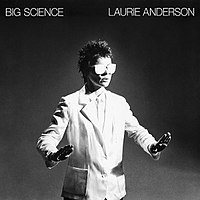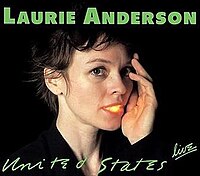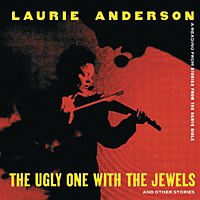Music Library: Laurie Anderson
 You're The Guy I Want To Share My Money With (with William S. Burroughs and John Giorno, 1981). Contains rough versions of tracks from Laurie Anderson's United States Live show plus a number of tracks of Burroughs telling his wry stories and two unlistenable John Giorno long-form poems. They might be good, but I can't tell because both use voice modulators that have me reaching for the forward button faster than the opening chords of "Hotel California."
You're The Guy I Want To Share My Money With (with William S. Burroughs and John Giorno, 1981). Contains rough versions of tracks from Laurie Anderson's United States Live show plus a number of tracks of Burroughs telling his wry stories and two unlistenable John Giorno long-form poems. They might be good, but I can't tell because both use voice modulators that have me reaching for the forward button faster than the opening chords of "Hotel California." Big Science (1982). Anderson's proper debut album is disorienting, psychedelic, witty, chilly, wise, even profound. It should be clear that I love it wholeheartedly. Although it consists entirely of reworked parts of her United States show, it never sounds like the distillation of anything. Except in the sense that it leaves me intoxicated. The first track is "From The Air," in which Anderson uses her authoritative and calm voice to guide listeners through the weirdest crash landing procedure, culminating in the lines: "put your hands over your eyes/jump out of the plane/there is no pilot/you are not alone." That reversal between crisis and comfort gets right at the heart of Anderson's brilliance: everyday is a crisis, a constant teetering over an unfathomable abyss that all authorities spend their entire careers trying to deny, and yet there is some strength to be reached in the notion that others are in this with you. And then, of course, there's "O Superman," her ode to misuse of authority, so scalding that I'm surprised that Ronald Reagan was ever able to return to his office after this song came out. Seems like the smart thing to do would have been to retire with some remaining semblance of dignity.
Big Science (1982). Anderson's proper debut album is disorienting, psychedelic, witty, chilly, wise, even profound. It should be clear that I love it wholeheartedly. Although it consists entirely of reworked parts of her United States show, it never sounds like the distillation of anything. Except in the sense that it leaves me intoxicated. The first track is "From The Air," in which Anderson uses her authoritative and calm voice to guide listeners through the weirdest crash landing procedure, culminating in the lines: "put your hands over your eyes/jump out of the plane/there is no pilot/you are not alone." That reversal between crisis and comfort gets right at the heart of Anderson's brilliance: everyday is a crisis, a constant teetering over an unfathomable abyss that all authorities spend their entire careers trying to deny, and yet there is some strength to be reached in the notion that others are in this with you. And then, of course, there's "O Superman," her ode to misuse of authority, so scalding that I'm surprised that Ronald Reagan was ever able to return to his office after this song came out. Seems like the smart thing to do would have been to retire with some remaining semblance of dignity. Mister Heartbreak (1984). Her second album borrowed more parts of United States Live and added Bill Laswell (last seen here in yesterday's Last Exit video) as co-producer and bassist, Adrian Belew on guitar, and a bunch of other people, including William Burroughs and Peter Gabriel on vocals. The songs include "Gravity's Angel," which mentions and seems inspired by Pynchon's Gravity's Rainbow, although it doesn't borrow imagery quite as directly as Wikipedia suggests, and "Langue d'Amour," a love song like no other. But it's not quite as great as Big Science.
Mister Heartbreak (1984). Her second album borrowed more parts of United States Live and added Bill Laswell (last seen here in yesterday's Last Exit video) as co-producer and bassist, Adrian Belew on guitar, and a bunch of other people, including William Burroughs and Peter Gabriel on vocals. The songs include "Gravity's Angel," which mentions and seems inspired by Pynchon's Gravity's Rainbow, although it doesn't borrow imagery quite as directly as Wikipedia suggests, and "Langue d'Amour," a love song like no other. But it's not quite as great as Big Science. United States Live (1984). This is the motherlode of raw material in context from Anderson's two-night, eight-hour performance piece, minus the purely visual parts. As the clip below shows, Anderson uses a purely American salesman-type persona (with a voice modulator to gie her more authority) to tell time-bomb jokes (y'know, they land at the time, but they really go off only after you've had time to think about them). Covering four discs and a little over four hours of music and spoken word pieces, this is not for the casual listener. But if you're a fan, it's not just necessary but vital. I bought mine the moment I saw it was available, and I've never regretted it for a second.
Home of the Brave (1986). As some friends and I discovered when quite a bit messed-up in college, the movie of Home of the Brave has a curious and purely unintentional symmetry with Fantasia. Anderson's website has been promising a DVD release of this movie for some time. I hope they get on that soon. But we're here because of the album, which is partially a soundtrack but partially recorded in a studio. The Home of the Brave performances included much of the tour for Mister Heartbreak, but most of the material here is new, or at least newly lifted from United States Live. And man, is it great. Some of Anderson's funniest material is here: "Smoke Rings," which tears apart gender roles with the question of how Romantic languages assign gender to nouns, "Talk Normal," which mocks dreams for their lack of narrative sense, and "Language Is A Virus," which contains some of her best in-jokes about herself. "White Lily" is something I will never shake. Take a gander:
Strange Angels (1989). And here Anderson made a pop album. A lovely pop album with much more singing than before and fewer stories and spoken-word sections. I remember hearing her explain somewhere that this album was inspired by a friend's death from AIDS, but I haven't found corroboration online. Anyway, this is an amazing work, different from what came before, but still quite powerful and moving.
Bright Red (1994). Accompanying her quite personal performance artwork Stories From The Nerve Bible, Bright Red puts Eno in the producer's chair and manages to sound more fully realized than any other Anderson album. This isn't to say that Bright Red is one of the best, but that the dreamlike sounds merge well with the dreamlike lyrics. It should provide a little context when I say that the worst song on the album is her collaboration with then-boyfriend, now-husband Lou Reed, a guy who usually brightens things up with his guest appearances. Here's "World Without End," which contains the awe-inspiring eulogy "when my father died, we put him in the ground/when my father died, it was like a whole library burned down."
The Ugly One With The Jewels And Other Stories (1995). Here's the story side of Stories From The Nerve Bible, which - I feel compelled to say - I saw performed, along with a performance in which she was working on this material and a performance in which she was moving on to her next project. This is the least song-like of any Anderson album, including United States, consisting mostly of autobiographical (or, at least, supposedly autobiographical) stories. The attached clip gives an idea of how Anderson remixes her songs into her stories, using phrases from songs to deepen the meaning of her work. Great story, full of life and humor, ending with some powerful, incisive poetry.
Talk Normal: The Laurie Anderson Anthology (2000). I'm not sure how well this one works overall. I snatched up the tracks from United States when it was unavailable some years back. Now I don't need them, but I haven't erased them because, well, I paid for them, y'know.
Life On A String (2001). This album disappointed me so much. See, I love Moby-Dick, and I was sad that I'd never gotten to see Anderson's performance work Songs And Stories From Moby Dick. This album only has three of those songs, and I find that I couldn't give less of a pequod. "Slip Away," about the death of her father, was better conveyed by "World Without End." I dunno, it just don't move me.
And simply for your pleasure, here's a couple of videos Anderson made of her and her, well, clone:

















0 comments:
Post a Comment